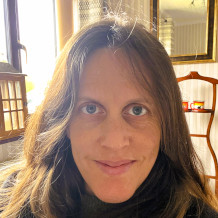Jo Taylor, Research Fellow, York Trials Unit, Department of Health Sciences
Jo has worked in applied health services research for over 15 years, with a main focus on exploring how interventions are experienced by those who receive and deliver them and examining adoption and implementation of new and existing innovations.

More recently, Jo has completed her nursing training and now also works as a mental health nurse in an Early Intervention in Psychosis service.
Jo’s research uses mainly qualitative, co-design and mixed methods designs, drawing on implementation and behavioural science to explore the complexity of health care experiences and service delivery.
Email: jo.taylor@york.ac.uk
Our 60-second interview with Jo:
Could you please tell us what work you do in the field of mental health?
I am a mental health nurse working in an Early Intervention in Psychosis service, and I also work as an applied health researcher in the York Trials Unit at the University of York. I helped to establish the DIAMONDS research programme which focuses on improving outcomes for people with diabetes and severe mental illness, and I have been involved in research considering mental health in the context of gender questioning children and adolescents, and children and young people with life-limiting conditions. I am currently developing research examining the implementation of At-Risk Mental State services in the UK, which aim to prevent onset of first episode psychosis in those deemed ultra-high risk.
What do you find most rewarding and inspiring in this work?
I feel privileged to work with people who experience mental health difficulties, who put their trust in our services and institutions and allow us into their lives in the hope of recovery. That people open their doors and welcome us in when things are difficult or share their experiences for the aim of research is the most rewarding aspect of both my nursing and research roles.
What is the most challenging or complicated aspect of this work?
In practice it can sometimes be difficult knowing that some of the work we do as nurses is not evidence-based and that we still have a lot to learn about mental health illnesses and the best ways to manage and treat these. Translating evidence into practice is also a challenge, and whilst I recognised this when solely working in research, I have a greater understanding of the barriers to achieving this now that I also work as a mental health practitioner.
What impact do you hope your work is having - or can potentially have?
I hope that my role as both a researcher and mental health nurse will bridge the gap between evidence and practice. I incorporate and promote the use of evidence in my nursing practice every day and work hard to ensure I develop research that matters to the people I work with – both patients and colleagues.
Could you share with us one piece of advice that you follow for your own mental health?
No matter how busy I am, I try to integrate physical activity, time outdoors and enjoyable activities into my day-to-day life. And when I don’t achieve this, I simply re-set and start again because of the positive impact these activities have for my wellbeing, and for my work.
